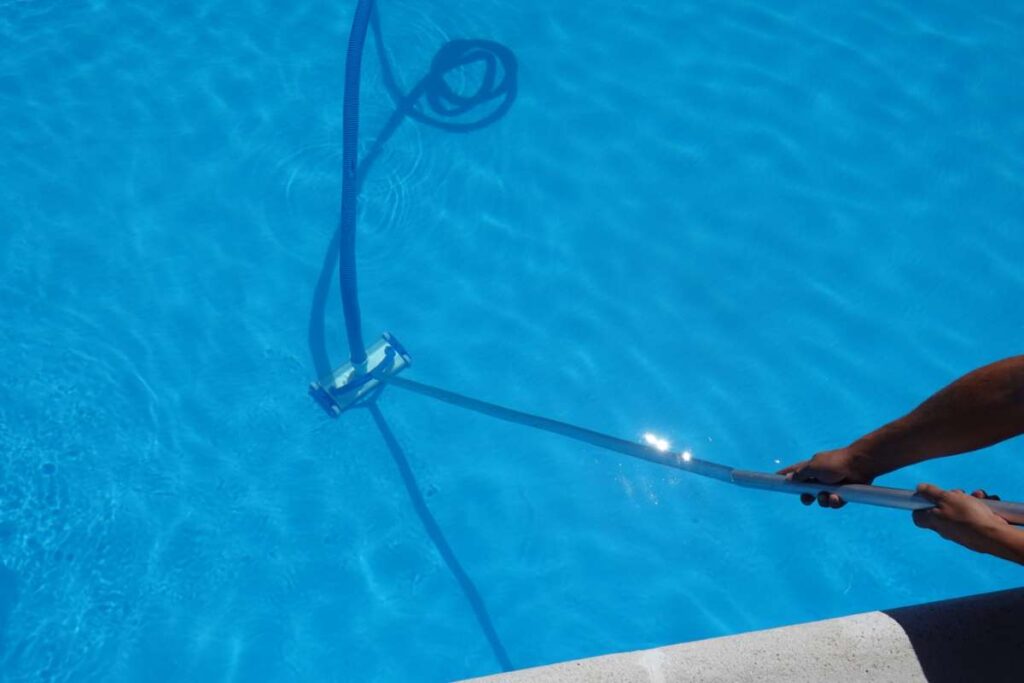Learn essential safety measures for handling pool chemicals to protect yourself and others while maintaining your pool’s cleanliness and safety.
How to Stay Safe While Working With Pool Chemicals
Working with pool chemicals is crucial for maintaining a clean and safe swimming environment, yet it poses significant risks if not handled properly. This blog post delves into the importance of safety when managing pool chemicals, outlining best practices, potential hazards, and the necessary precautions to take. By the end of this article, you will have a comprehensive understanding of how to safely work with pool chemicals, whether you are a pool service professional or a homeowner maintaining your own pool.
As pool ownership and maintenance continue to grow in popularity, understanding the risks associated with pool chemicals has never been more important. Pool chemicals, such as chlorine, algaecides, and pH balancers, are essential for ensuring water quality, but they can also be dangerous. By implementing proper safety protocols, you can minimize risks and promote a safer environment for yourself and your loved ones. In this article, we will explore the various types of pool chemicals, the dangers they pose, and the best practices to keep you safe while handling these substances.
Understanding Pool Chemicals
Before delving into safety practices, it’s essential to understand the types of pool chemicals commonly used and their respective roles. Chlorine, for example, is a widely used disinfectant that helps eliminate harmful bacteria and viruses in pool water. However, while effective, it can also produce harmful fumes if not managed correctly. Other chemicals, such as algaecides, flocculants, and pH adjusters, also play important roles in pool maintenance, each with specific handling requirements.
Many pool owners may not realize the potential hazards associated with these chemicals. Chlorine can cause skin and eye irritation, and inhaling its fumes can lead to respiratory issues. Similarly, algaecides may contain harsh chemicals that can be dangerous if ingested or improperly mixed with other substances. According to the Centers for Disease Control and Prevention (CDC), proper handling and storage of pool chemicals can significantly reduce the risk of accidents and injuries.
Statistics reveal that thousands of pool-related chemical injuries occur each year, underscoring the importance of education and safety measures. The CDC reported over 4,000 pool-related injuries in the United States annually, many of which involve chemical burns or respiratory problems. Understanding pool chemicals and adhering to safety guidelines can help prevent these incidents, ensuring a safer experience for all pool users.
Essential Safety Equipment
One of the first steps in ensuring safety while working with pool chemicals is to invest in essential safety equipment. Personal protective equipment (PPE) should always be worn, including safety goggles, gloves, and masks. Goggles protect your eyes from splashes, while gloves prevent skin contact with harsh chemicals. Masks or respirators are especially important when working with volatile substances that can release harmful fumes.
In addition to personal protective equipment, ensure that your workspace is well-ventilated. Proper ventilation reduces the concentration of harmful fumes in the air, mitigating the risk of respiratory irritation. If you are working indoors, consider using exhaust fans or opening windows to promote airflow. Having a safety shower and eyewash station nearby is also a prudent measure, allowing for immediate decontamination in case of exposure.
Furthermore, always have a first aid kit readily available. This kit should include items specifically for chemical exposure, such as burn ointment and eye wash solution. Familiarize yourself with the contents and how to use them. In case of an emergency, knowing how to react quickly can make a significant difference in minimizing injury.
Safe Handling and Storage Practices
Safe handling practices are critical when working with pool chemicals. Always read the labels and Safety Data Sheets (SDS) for each product you use. These documents provide essential information on hazards, handling procedures, and first-aid measures. By understanding the risks associated with each chemical, you can take appropriate precautions and ensure safe usage.
When mixing chemicals, exercise caution and never combine substances unless specified by the manufacturer. Mixing chlorine with other chemicals, such as acids or algaecides, can produce dangerous gases like chloramines, which can lead to severe respiratory distress. Always add chemicals to water, and never the other way around, to prevent violent reactions.
Additionally, proper storage of pool chemicals is crucial for safety. Store them in a cool, dry place away from direct sunlight and moisture. Ensure that containers are tightly sealed and labeled clearly to prevent accidental mixing or misuse. Create a dedicated storage area for pool chemicals, keeping them out of reach of children and pets. Following these guidelines will help maintain a safe environment both for yourself and others.
Emergency Procedures
Despite taking all necessary precautions, accidents can still happen. Knowing how to respond in case of a chemical spill or exposure can save lives. If you find yourself in a situation where chemicals have spilled, avoid direct contact with the substance. Depending on the type of chemical, you may need to follow specific cleanup procedures outlined on the product label or Safety Data Sheet.
If skin contact occurs, remove contaminated clothing and rinse the affected area with plenty of water for at least 15 minutes. Seek medical attention if irritation persists. In the case of eye exposure, flush the eyes with clean water for 15 minutes while holding the eyelids open, and seek immediate medical assistance.
Should inhalation occur, move to fresh air immediately and monitor the individual’s breathing. If they experience difficulty breathing or show signs of distress, call emergency services promptly. Knowing these emergency procedures can aid in minimizing the effects of exposure and ensuring the safety of all parties involved.
Regular Training and Education
Staying informed about the latest safety practices and regulations regarding pool chemicals is vital for anyone working in the pool maintenance industry. Regular training sessions can provide updates on handling procedures, new products on the market, and any changes in local regulations. Consider enrolling in courses offered by professional organizations within the pool industry.
In addition to formal training, educate yourself and your team about the importance of safety protocols. Regularly review safety procedures and encourage open discussions about challenges faced while handling pool chemicals. Creating a culture of safety ensures that everyone is aware of the risks and is committed to fostering a safe working environment.
Moreover, staying connected with industry professionals and participating in forums can provide valuable insights into effective safety measures. Collaborating with others in the field allows you to share experiences and learn from one another’s best practices.
Conclusion
Working with pool chemicals is a responsibility that requires vigilance and knowledge. By understanding the hazards associated with these chemicals and implementing proper safety measures, you can protect yourself and those around you. Always prioritize safety by using personal protective equipment, following proper handling and storage procedures, and being prepared for emergencies.
The significance of safety in the pool maintenance industry cannot be overstated. As you manage your pool or consider investing in a pool service business, remember that prioritizing safety not only protects your health but also contributes to the overall well-being of your clients and community. If you’re looking to explore opportunities within the pool service industry, consider checking out [Pool Routes for Sale](https://pool-routes-for-sale.com/) to find established routes and resources to help you succeed.



